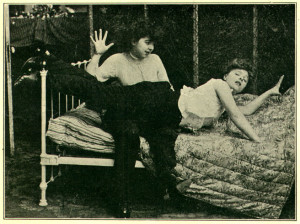My Lady Juices Are Not Obscene: A Personal Reflection on UK’s Pornography Laws
The UK has recently amended their Communications Act 2003 with Audiovisual Media Services Regulations 2014, which states that all Video on Demand (VoD) produced and distributed in the UK must conform to a new set of standards, the same ones laid out for pornographic DVDs sold at sex shops, and must not contain any ‘specially restricted material’, as defined by the British Board of Film Censors (BBFC) and The Obscene Publications Act 1959 & 1964 – England and Wales. The specially restricted material, some of which are listed below, have been defined as obscene, which means the decisions on what to include as restrictions are based on moral judgements.
Specially restricted material includes (wording in square brackets is mine):
- Spanking beyond a gentle level

- full bondage and restraint (in conjunction with a gag and all four limbs restrained)
- Caning
- Aggressive whipping [‘aggressive’ is subjective]
- Penetration by any object “associated with violence” [which, as many people have already pointed out, could include penises]
- Physical or verbal abuse (regardless of if consensual)
- Urolagnia (known as “water sports”)
- Female ejaculation [or squirting or gushing; considered water sports]
- Strangulation
- Facesitting
- Fisting
Aside from the broader legal aspects and content creation issues this will have on the UK’s pornographic film producers, actors and distributors, there are a few concerns with the ‘restricted material’ I feel are worth raising, from the perspective of a woman who not only watches pornography, but who also enthusiastically participates in most of these ‘obscene’ acts.
I grew up in a very conservative household where we did not talk about sex or our bodies. As an adult, a lot of what I learned about sex and human sexuality was by first seeing it in porn and then by experimenting with a partner. For me, as for many people, spanking was my first introduction to something a little bit kinky.
Female ejaculation is something I learned women could do about five years ago after seeing it in porn, and recently discovered it was something I was able to do – a personal milestone in terms of my own sexual growth, and in self-acceptance as a sexual being. I feel that by defining this act as obscene, it creates an association of shame for women.
The UK, and other countries such as Australia, have decided that female ejaculate is urine, and therefore, obscene; the BBFC’s justification for labelling female ejaculate as obscene is because:
“the expert medical advice it received was that there is no such thing as female ejaculation, and therefore the films deemed to show urine. Urination during sex is considered to be obscenity under English Law. The Board later stated instead that it does not take any view on whether female ejaculation exists, only claiming that all examples its members have seen thus far during classification have been urination during sex.” – Wikipedia article on Female Ejaculation, under Censorship heading
 I am not a medical doctor, so I won’t claim for certain that female ejaculate absolutely does not contain urine, but I find it problematic that an entertainment industry board can make a decision about what is or isn’t obscene about a woman’s body and our physiology, and whether due to ignorance or denial, is not able to accept that female ejaculation is possible.
I am not a medical doctor, so I won’t claim for certain that female ejaculate absolutely does not contain urine, but I find it problematic that an entertainment industry board can make a decision about what is or isn’t obscene about a woman’s body and our physiology, and whether due to ignorance or denial, is not able to accept that female ejaculation is possible.
But does it really matter whether or not it’s urine? Why is urine obscene and male ejaculate not? They are both bodily fluids and have their own associated health risks.
I am also not a lawyer, so I’m not going to make a comparison to Canada’s pornography or obscenity laws (which, from what I understand, are a little bit more flexible in interpretation and application). Nor will I speculate as to the societal benefits of UK’s pornography regulations, as I do not reside in the UK and am unable to form an opinion on the moral health of its citizens. But, are the benefits of censorship worth shaming and alienating the group of people for which the content was intended?
The BBFC’s justification for the new guidelines for online pornographic videos is to align the standards with physical copies sold at sex shops (essentially closing a loophole), which in turn were designed to protect minors. While I can certainly appreciate any well-meaning intent of a law or regulations, my perspective on this is that by deciding that these acts are obscene, it basically declares that consensual kink and BDSM is unhealthy, dangerous and disgusting. BDSM is not without its risks, but as adults we have to be able to be aware of them. Considering the exposure we have to real-life violence everyday across various media platforms, banning a woman from sharing her lady juices in an R-rated pornographic film seems a bit ridiculous.
It’s not uncommon for people to use laws to justify passing judgement on others, to shame them, even harass or bully them. I am a sexual being. I enjoy sex and physical acts in a sexual context. I do not like being told that what I do is obscene, or being made to feel ashamed for my choices.
Sexual curiosity and exploration is perfectly normal, and kink and BDSM, when mutually consensual, can be part of a healthy relationship. Defining specific acts as obscene passes judgement on those who enjoy or participate in such acts, or who may only be curious about exploring something more than the missionary position with the lights out. Not allowing these acts to be depicted in porn sends a message that it is wrong to do them.
For a more legal perspective and further explanations of the banned acts, see http://obscenitylawyer.blogspot.co.uk/
Photo Credits: WillVision and Vanity Fair (1903)



It still in 2015 amazes me that we as a people have not gotten past this utterly ridiculous puritanical idea of sexual lives. We are born sexual beings and from day one we explore it and learn of it and try to come to terms with it, some more so than others. And gawd knows that life is difficult enough whit out having mamby pambys and government officials ruling on how we as world citizens have to be dictated to by these social morons and religious idiots who feel,the strong need to control and dictate how others should live. And since when a woman who squirts when she orgasms is it anyone’s business. We are human beings first and foremost not simpletons who need to be coddles by those who feel & think they are right. I say ” Up KINKY SEX” world wide.